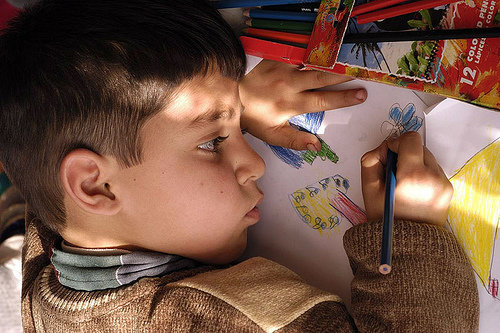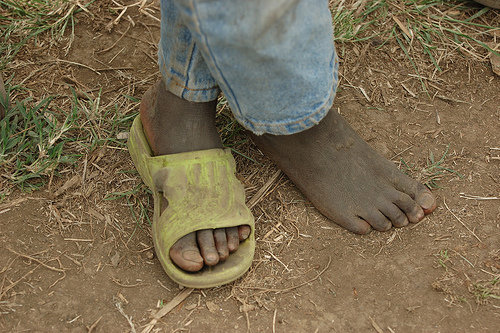UNICEF has an incredibly neat advocacy program for children called the "Convention on the Rights of the Child." This is considered a completely non-negotiable set of standards and rights designed to respect every child's sense of self-worth, dignity, and health (mental, emotional, and physical) regardless of race, age, sexual orientation, and socio-economic status. It's a legally agreed upon WORLDWIDE contract, a special convention just for kids, to help provide a bare minimum of regulations. The only situation in which these rules don't apply is when the local laws actually provide more protection for children than UNICEF's.
They consist of 54 individual rights, and two "optional protocols." Their efforts to protect children worldwide are so admirable. However, I'm not entirely sure some countries, including the US, really live up to the rules they agreed to. Paraphrased, here are 25 of the rights every single child in the world should have:
- Non-discrimination. No matter if a child is rich or poor, male or female, disabled or of any race or sexuality, children shouldn't be treated unfairly.
- Best interests of the child. The best interest of the child should be the reason for all decisions made — especially policies, law makers, and budget controllers, adults should do what is best for children.
- Protection of rights. Children's rights should be respected, protected, and fulfilled, whether we're talking government policies and laws, or even social and health services and, of course, within the home.
- Parental guidance. Government should allow parents to direct and guide their children in a manner that helps them understand their own rights, but without pushing them into actions or have consequences they're too young to understand. Without taking away choice from parents, governments should provide assistance to families to help them fulfill their role as a nurturer.
- Survival and development. Kids have the right to survive and develop healthily.
- Registration, name, and nationality. Children have a right to have an official record of who they are, an official name, belong to a country, and to know (as much as possible) and be cared for by their parents.
- Separation from parents. Children have the right to live with and remain in contact with both parents, unless it hurts the child, and move between houses of separated parents.
- Respect for the views of the child. Even if your child is a preschooler, your child should have a right to have a say in their life, especially in court, though of course with more age comes more weight behind their opinion.

Freedom of expression.
Children have the right to share, learn, and express themselves in any way they choose, with respect for the freedom, rights, and reputation of others.- Right to privacy. Their homes, way of live, families, and their good names should be protected from attack.
- Access to information and mass media. Children should have access to children's books, radio, newspapers, television, or Internet to learn about things important to their own health and well-being.
- State assistance. The government does not have the right to take responsibility for children away from parents (unless they're in danger), but has an obligation, especially when both parents are working, to aid and support them to be able to properly care for their kids.
- Protection from all forms of violence. Governments should protect children from mental, physical, and emotional abuse and neglect. This includes forms of discipline that involve violence — discipline is to be age-appropriate, with respect for the child's best interests and development.
- Children deprived of family. For kids who cannot be looked after their own family, they have a right to be cared for by someone who respects their ethnicity, religion, culture, and language.
- Adoption. Children have the right to protection in foster care or adopted homes, where the first concern must be their welfare.
- Children with disabilities. Kids with any kind of disability must be provided special care and support to help them live full and independent lives.
- Health and health services. Children have the right to good quality health care, safe drinking water, nutritious food, and a clean and safe environment — and rich countries should help poor countries achieve this.
- Social security. Children have the right to get help from the government if poor or in need.

Adequate standard of living.
Homes and quality of life should be beneficial to their mental and physical needs.- Education. All kids should have the right to primary education, and poor countries should receive help from rich countries to achieve this. Discipline within schools should respect a child's dignity, which must not include mental, physical violence, abuse, or neglect. Schools should be run in an orderly fashion, and children should be encouraged to become as educated as possible.
- Goals of education. Education should develop each individual child's personality, abilities, and talents to the fullest. They should be encouraged to respect other people's rights and cultures, learn to live peacefully with others, and protect the environment and other people. Education should aim to value and respect beliefs and culture of all parents, though it's up to individual countries to decide on things like dress codes, national anthems, or prayer.
- Leisure, play, and culture. Kids have the right to a variety of recreational activities, but also to have time to just relax and play.
- Sexual exploitation, abduction, sale, and trafficking. Children should be protected from all forms of exploitation, sexual abuse, sales, prostitution, and pornography.
- Detention and punishment. Children who break laws should not be treated cruelly, nor put in jail with adults or banned from contact with their families. Punishment can never be cruel or harmful.
- Rehabilitation of child victims. Children who have been abused, neglected, harmed, or exploited should receive special help to reintegrate into society, and restore their health, self-respect, and dignity.
Do you feel we live up to the terms of the Convention? Do you agree with all points?
Images via UNICEF>; unicefiran/Flickr; Julien Harneis/Flickr




